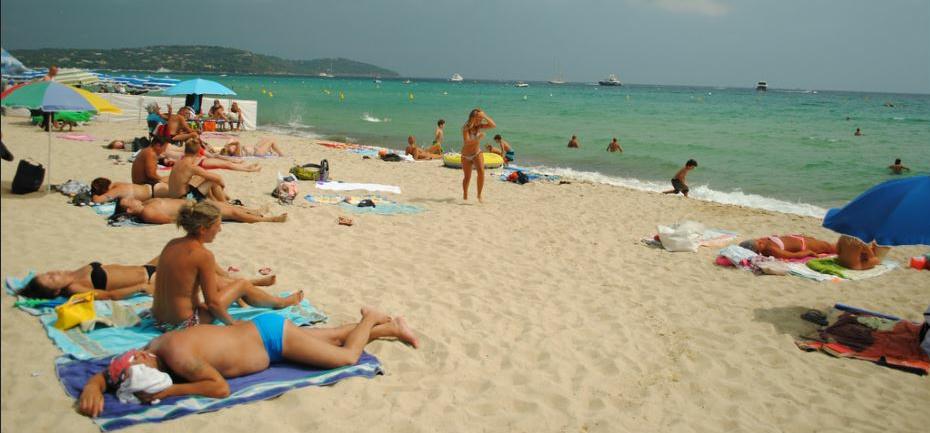Global Wealth Grows, Inequality Gap Widens

The wealthy enjoy the sun at St. Tropez, a coastal town on the French Riviera known for its beaches and nightlife. (Photo by Vinicius Pinheiro) Creative Commons license via Flickr
By Sunny Lewis
WASHINGTON, February 6, 2018 (Maximpact.com News) – “Growth will be short-term if it is based on depleting natural capital such as forests and fisheries. What our research has shown is that the value of natural capital per person tends to rise with income,” says Karin Kemper, senior director, Environment and Natural Resources Global Practice at The World Bank.
“This contradicts traditional wisdom that development necessarily entails depletion of natural resources,” Kemper said, commenting on a freshly minted World Bank report.
Global wealth “grew significantly” over the past two decades but per capita wealth “declined or stagnated” in more than two dozen countries in a range of income brackets, finds the new report.
“The Changing Wealth of Nations 2018” tracks the wealth of 141 countries between 1995 and 2014 by aggregating natural capital, such as forests and minerals; human capital, earnings over a person’s lifetime; produced capital, such as buildings and infrastructure; and net foreign assets.
It follows similar World Bank assessments in 2006 and 2011, but, for the first time, this report includes estimates of human capital.
Human capital accounts for two-thirds of global wealth, the researchers calculate.
Using household surveys to estimate lifetime earnings, the researchers measured human capital as the value of earnings over a person’s remaining work life, thereby incorporating the roles of health and education.
Women account for less than 40 percent of global human capital because of lower lifetime earnings. Achieving gender equity could increase human capital wealth by 18 percent, the report finds.
Produced capital accounts for a quarter of all wealth, according to the report.
Natural capital accounts for one tenth of global wealth, and it remains the largest component of wealth in low-income countries (47 percent in 2014).
Natural capital accounts for more than one-quarter of wealth in lower-middle income countries.
The report finds that global wealth grew an estimated 66 percent – from $690 trillion to $1,143 trillion in constant 2014 U.S. dollars at market prices.
But inequality is clearly apparent, as wealth per capita in high-income OECD countries was 52 times greater than in low-income countries.
Another report confirms the inequality. According to the Credit Suisse Global Wealth Report, published in November 2017, the richest one percent of people in the world now own half of the planet’s wealth.
The Credit Suisse study shows how the super-rich have profited from the aftermath of the 2008 global financial crisis, and so are now seeing their proportion of the world’s wealth increase from 42.5 percent in the midst of the crisis to 50.1 percent now.
The wealthiest 10 percent of people, own 87.8 percent of the global wealth.
A report from the Boston Consulting Group last June finds that globally, almost 18 million households control more than $1 million in wealth.
The world’s wealth “gained momentum” last year, Boston Consulting Group report concludes, rising 5.3 percent globally from 2015 to 2016.
The firm expects growth to accelerate to about six percent annually for the next five years, in both the United States and globally.
World Bank Group President Jim Yong Kim said, “By building and fostering human and natural capital, countries around the world can bolster wealth and grow stronger. The World Bank Group is accelerating its effort to help countries invest more – and more effectively – in their people.”
“There cannot be sustained and reliable development if we don’t consider human capital as the largest component of the wealth of nations,” said Kim. A South Korean-American physician and anthropologist, Kim has served as the 12th president of the World Bank since July 1, 2012.
Wealth accounts for countries are compiled from publicly available data drawn from globally recognized data sources and with a methodology that is consistent across all countries.
Some wealth components from natural capital were not tracked in this report, including water, fisheries and renewable energy sources.
The report was funded in part by the Wealth Accounting and the Valuation of Ecosystem Services (WAVES) partnership and by the Global Partnership for Education .
WAVES is a World Bank-led global partnership that aims to promote sustainable development by ensuring that natural resources are mainstreamed in development planning and national economic accounts.
WAVES was launched at the 2010 Convention on Biological Diversity meeting in Nagoya, Japan.
Botswana, Colombia, Costa Rica, Madagascar, and the Philippines were the initial core implementing countries that embarked on programs for natural capital accounting endorsed at the highest level of their governments, with extensive technical support from WAVES.
These countries have established national steering committees, carried out stakeholder consultations, identified policy priorities and designed work plans that are now being implemented.
Guatemala, Indonesia and Rwanda joined WAVES as core implementing countries in late 2013.
These countries are compiling accounts for natural resources like forests, water, and minerals, following the System of Environmental-Economic Accounting (SEEA) Central Framework. They are working on experimental accounts for ecosystems like watersheds and mangroves.
The SEEA Framework integrates economic and environmental data to provide a comprehensive and multipurpose view of the interrelationships between the economy and the environment, and the stocks and changes in stocks of environmental assets, as they bring benefits to humanity.
It contains the internationally agreed standard concepts, definitions, classifications, accounting rules and tables for producing internationally comparable statistics and accounts.
WAVES’ work on developing a methodology for ecosystem accounting is guided by a Policy and Technical Experts Committee that includes experts in environmental economics, natural sciences, and national accounting.
WAVES is funded by the European Commission, Denmark, France, Germany, Japan, the Netherlands, Norway, Switzerland, and the United Kingdom and overseen by a steering committee.
These reports are aimed at policy makers but will interest anyone committed to building a sustainable future for the planet.
Featured Image: World Bank Group President, Jim Yong Kim in Lima, Peru, June 29, 2013. Photo by Dominic Chavez courtesy World Bank) Creative Commons license via Flickr
